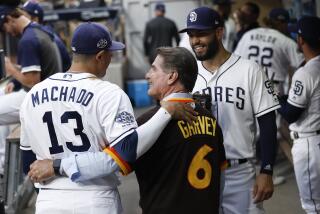Kerrey Struggles to Live Up to His Image : Politics: The Nebraska senator and war hero zigzags between stirring oratory and wishy-washy speeches. His campaign contains mixed messages.
- Share via
HANOVER, N.H. — The clash between illusion and reality confronted Nebraska Sen. Bob Kerrey the other night as he blistered through his usual speech in an ornate Dartmouth College auditorium. One by one, then in groups, students picked up their bags and left. By the time Kerrey finished, a quarter of his audience had vanished.
Why? According to a Kerrey aide, the students were heading to a screening of “JFK”, the controversial new movie about the assassination of the man whose 1960 call to greatness was echoed in Kerrey’s presidential announcement last September.
It proves an apt metaphor for the difficulty in which Kerrey now finds himself trying to compete with an image that most of the time is better than reality.
Here in New Hampshire, where Kerrey has been lagging behind in the polls and coming up short in what an aide calls “the expectations thing,” the Nebraska senator’s campaign is bumping along unevenly.
For every bit of soaring oratory that draws on his experience in the Vietnam War--where he lost part of a leg and was awarded the Medal of Honor--there is a diffident, distanced performance that leaves his audience shrugging their shoulders halfheartedly.
With a month remaining before the nation’s first primary here, Kerrey maintains a public confidence that his message will find an audience willing to stay put whatever the competition.
At the same time, however, he has placed renewed emphasis on gibes directed at Arkansas Gov. Bill Clinton, whose campaign has picked up steam lately. One seems an obvious reference to Clinton’s current television ads, which invite voters to call in for a magazine-sized copy of his campaign proposals.
“I hope in this campaign we do not measure our leaders by their ability to produce a lengthy document,” Kerrey pointedly told high school students in Manchester, N.H., on Friday. “If substance counts, it counts to be able to describe where you want to go, what it is you see in the world.”
But it is in trying to explain what he sees in the world that Kerrey can come across as contradictory, even wishy-washy.
For example, Kerrey has pinned much of his hopes on the appeal of a national health care plan he introduced in the Senate last summer. He boasts of the plan in a television commercial set in a hospital ward.
But when speaking at campaign stops, Kerrey regularly notes that he is revising the bill even now and is open to suggestions.
“My bill is an attempt to say here’s what I think the majority wants,” he said. “In the end, the majority will rule.”
More obvious is the chasm between what Kerrey says and what his television advertising suggests about the touchy subject of Japanese trade.
Kerrey’s television commercial, running regularly in New Hampshire, implies that he would take a hard line against the Japanese.
“I’ll tell Japan (that) if we can’t sell in their markets, they can’t sell in ours,” he says in the ad, in which he stands next to an empty hockey goalie’s net to underscore the need for Americans to “play a little defense.”
But in his speeches, Kerrey takes pains to praise the Japanese for supporting their own industries, and he lays much of the blame for America’s trade deficit squarely at home.
“We do have to be tough with trading partners and allies like the Japanese that have been protecting the marketplace,” he told the Dartmouth students. “But we have got to be tough here at home (as well.)”
Adviser Will Kanteres said Kerrey means no contradiction.
“It’s a 30-second commercial,” he said. “You can’t say everything.”
Kerrey’s basic message has remained the same since his fall announcement for the presidency. In stops in New Hampshire this week, as in every week since the campaign began, he has advocated a universal health care system financed with a 5% payroll tax and an industrial strategy that utilizes tax credits, research grants and venture capital to spread know-how to a broad range of American businesses.
He advocates construction of top-notch transportation and communications systems and says the nation should embrace policies that encourage high-paying jobs. In a thematic reach back to the 1960s, he demands that American leaders exhibit “bold” leadership instead of kowtowing to public opinion polls.
Frequently, in attempting to get specifics across, he lapses into lingo that fits on the Senate floor but mystifies many potential voters. Rarely, for example, does he explain the nuts and bolts of his health care proposal, wrapping it instead in terminology about “delivery systems.” When discussing trade, he refers to “Super 301” and “301” without ever defining them as powers that would allow the United States to sanction foreign competitors.
But then there are the jolting flashes of rhetoric that suggest the sort of potential that Kerrey intimates describe as Kennedyesque.
“We are Americans and we should conquer our fears,” he thundered Thursday in what has become a regular feature of his speeches.
“My fondest desire is that Americans of the year 2050 . . . will look back on the Americans of the 1990s and they will say those Americans were bold. They had courage. They were strong. They were willing to put themselves on the line for us.”
More to Read
Get the L.A. Times Politics newsletter
Deeply reported insights into legislation, politics and policy from Sacramento, Washington and beyond. In your inbox twice per week.
You may occasionally receive promotional content from the Los Angeles Times.











